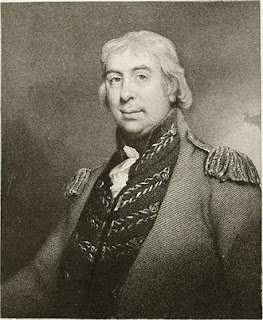Above image: Harris residence, Srirangapatna, KA: Later it became the residence of Dewan Puraniah after his retirement in 1811 CE. The house become headquarters of the commanding officer of Seringapatam and in 1809, this building the scene of a mayhem mutiny by the officers of the Madras Army, led by Col. Bell, protested against Sir. George Barlow, the Governor of Madras.......
Lord George Harris CGB (18 March 1746 – 19 May 1829), son of the Rev. George Harris, curate of Brasted, Kent after his education at Westminster School and at the Royal Military Academy, Woolwich, joined the Royal Artillery in 1760. After promoted as captain in 1771, his first active service was in the American War of Independence, in which he served at Lexington, Bunker Hill where he was severely wounded; later he saw several battles. Before his promotion as lieutenant-colonel in his regiment (1780), he married Anne Carteret Dickson. After his engagement in Ireland for some time he came to Bombay, India along with General Medows (31 December 1738- 14 November 1813; he was general in the British army, later he became Governor of Bomany in 1788 and Madras in 1790) and he worked with him till 1792, taking active role in various battles and engagements, notably under Lord Cornwallis and his famous raid on Srirangapatna in the Third Anglo-Mysore War (1790–1792: a conflict between the Kingdom of Mysore and the
East India Company and its allies, including the Maratha Empire and the
Nizam of Hyderabad). It was the third of four Anglo–Mysore Wars against Tipu Sultan . After a brief stint back in his home land, he was back in India in 1784. He became major-general, and in 1797 Commander-in-Chief of the Madras Army. Up to 1800 be commanded the troops in the presidency, and for a short time he worked in the civil government as well. In December 1798 he was directed by Lord Mornington, the governor-general, to command the field army against the Britisher's formidable enemy Tipu Sultan of Mysore. In a few months of intense campaigning and planning, along with Lord Wellesley, Harris stormed into Tipu's well-built strong fort at Srirangapatna and in the ensuing fierce battle Tipu died in its defense in 1799.
 |
Lord George Harris en.wikipedia.org
|
His success at Srirangapatna won him laurels, but he declined the offer of an Irish peerage. After his trip back home in 1800, he continued to serve the army and in 1812 he became full general. There he lived in Belmont House (County of Kent). In 1820 he received the GCB, and in 1824 the governorship of Dumbarton Castle. He remained colonel of the 73rd (Highland) Regiment of Foot from 1800 to his death. Gen. Harris died at Belmont in May 1829.
 |
Dewan Purnaiah of Mysore /alchetron.com
|
The Harris House located in Srirngapatna, Karnataka is a historical site and can be accessed through a path that lies in between Garrison Cemetery and Scott's bungalow. It was here Lord Harris lived for a short period after Tipu's death in 1799 when the British captured Mysore kingdom and was in the process of controlling it by restoring the kingdom back to the early ruler the Wodiyar Royal family. Very much impressed with political and administrative skill and the track record of Purnaiah, Gen. Harris appointed him as the first Dewan of Mysore. Earlier Purnaiah worked as the Dewan for Hyder Ali and Tipu Sultan and had excellent administrative skill, Hence the British needed some one like Purnaiah who had good management skill in running the kingdom
 |
Inscription, Lord Harris Residence, Seringapatam en.wikipedia.org
|
It was here after
his retirement from service in 1811, Purnaiah
chose to spend his retirement life in the house. It is also known as
the Doctor's Bungalow or Puraniah's Bungalow where he died on 28
March 1812.
Apparently a few days before his death Purnaiah wrote a letter to his friend
Col. Hill, Commandant of Seringapatam, stating 'old and infirm, after a life of
unusual activity and care, I am going to the land of my fathers. Responding to Purnaiah's letter Col. Hill replied, ''I am travelling the same road'' and passed
away a short time after Purnaiah. A tablet on the wall of this house shows the link between Lord Harris and Puraniah to this house












.webp)
